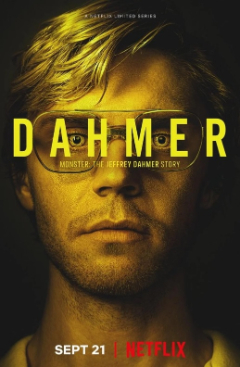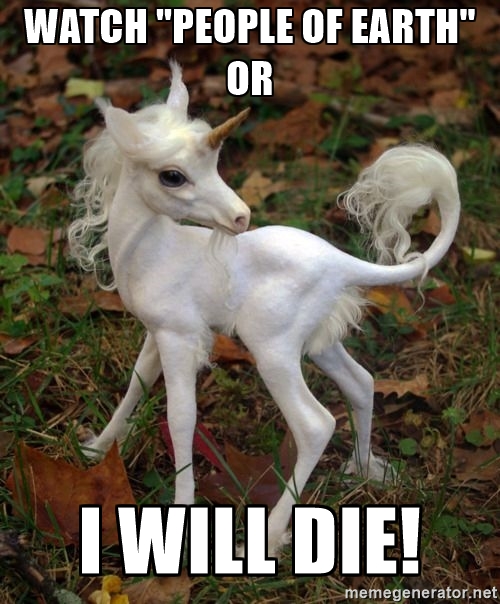I finally watched Dahmer this week.
Dealing with life and crimes of serial killer and cannibal Jeffrey Dahmer (played by Evan Peters), Dahmer premiered on Netflix last September and, despite not getting a lot of promotional push, it went on to become Netflix’s most-watched miniseries to date. I first tried to watch it in October. Then I tried again in November. And I tried a third time in January. All three times, I couldn’t make it through the first episode. The whole thing seemed so oppressively sad and dark that I couldn’t bring myself to stick with it. The image of Dahmer killing people in his ugly apartment and then drinking a beer while watching The Exorcist III was not an image that I wanted in my head.
This week, I decided to give the miniseries another shot. I did so for the most shallow of reasons. The Emmys are approaching and I don’t want to end up pulling a repeat of last year, where I had to scramble to somehow cram watching all of the possible contenders into a two-and-a-half week period. Because it’s a Netflix show and it’s a Ryan Murphy production and it portrays Dahmer has being the type of white male killer who could only thrive in a society shaped by systemic racism, Dahmer will probably be an Emmy contender. So, this week, I finally watched the entire miniseries.
Using the same jumbled chronology that sabotaged Ryan Murphy’s The Assassination of Versace, Dahmer tells the story of Dahmer, his crimes, and some of his victims. The first episode features Dahmer’s eventual arrest. The second, third, and fourth episodes give us a look at his childhood. The sixth episode tells the story of one of his victims. The remaining four episodes focus on the aftermath of Dahmer’s crimes. For the most part, the series is well-acted and it makes a convincing case that Dahmer could have been stopped if not for the biases and the incompetence of the Milwaukee police. That said, it’s also ten hours long and ten hours is a long time to spend mired in the darkness of Jeffrey Dahmer’s life and crimes. Much as with the second half of The Assassination of Versace, Dahmer gets bogged down by its refusal to trust the audience to be able to understand the show’s message. Any point that is made once in Dahmer will be made four more times, just to make sure that everyone picked up on it.
It’s a typical Ryan Murphy true crime production. While Murphy didn’t direct any of Dahmer’s ten episodes, he did produce and co-write the first four episodes. Both Murphy and Evan Peters have insisted that the show was not meant to make excuses for Dahmer. Murphy reportedly told the directors to make sure that the story was never told from Dahmer’s point of view and to keep the audiences on the outside looking in. To its credit, Dahmer doesn’t glorify him by portraying him as being witty, erudite, or in any way clever. As portrayed in this miniseries, Jeffrey Dahmer was an alcoholic loser who peaked in high school, despite the fact that he really wasn’t that impressive back then either.
But again, Dahmer is ten hours long and there are really only three episodes in which Dahmer is not the main character. Episode six is told from the point of view for Tony Hughes (Rodney Burford), who was one of Dahmer’s victims. Episode seven is told from the point of view of Glenda Cleveland (Niecy Nash), who was traumatized as a result of being Dahmer’s neighbor and who later became an activist on behalf of the families of Dahmer’s victims. In one of the many infuriating moments of the Dahmer saga, Glenda attempts to help one of Dahmer’s drugged victims, 14 year-old Konerak Sinthasomphone, just for the police to tell her to stay out of it before taking the 14 year-old back to Dahmer’s apartment. (Perhaps aware of how unbelievable that this scene will seem to some viewers, the show includes actual audio of the call that Glenda made to the police to check on what had happened to the child that she tried to save. As Glenda points out that the child was bleeding and obviously drugged, the police brusquely tell her to mind her own business.) Episode eight focuses on Lionel (Richard Jenkins), Dahmer’s guilt-stricken father. All of three — especially Richard Jenkins — give stand-out performances but it is ultimately Dahmer who dominates. Indeed, though the miniseries portrays Dahmer as being a compulsive killer, it still can’t resist portraying his grandmother as being a fundamentalist scold who won’t stop telling Dahmer that he needs to go to church. It still can’t resist portraying Dahmer’s first victim as being a homophobe. It still can’t resist a sequence depicting the execution of an unrepentant John Wayne Gacy, as if to argue, “At least Dahmer said he was sorry!” Intentional or not, the decision to put Dahmer at the center of the story does encourage the viewer to make excuses for him.
With the exception of the episodes centering on Tony Hughes and Konerak Sinthasomphone, it is hard not to feel that the documentary focuses on Dahmer at the expense of his victims. (It should be noted that Tony Hughes’s mother is among those who have been critical of the miniseries and its portrayal of Tony as being Dahmer’s “boyfriend” before his murder.) Until the end of the miniseries, we don’t find out the names of the majority of Dahmer’s victims and it largely feels like an afterthought.
In the end, the miniseries is overlong and, while it certainly doesn’t glorify him, it still occasionally falls into the trap of making excuses of Dahmer. The film ends by ruefully noting that, despite the efforts of Glenda Cleveland, no memorial has ever been built for the victims of Jeffrey Dahmer. This miniseries could have been that memorial if it had focused on them instead of on him.




